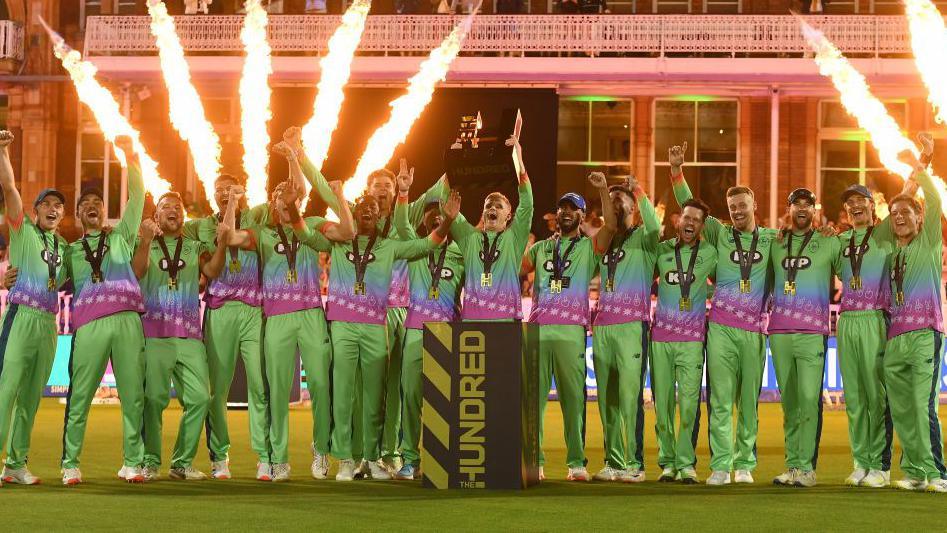'Huge gap' between Hundred hosts & other counties

The Oval Invincibles men won The Hundred in 2024
- Published
A report into the financial health of county cricket has revealed a yawning gap between those clubs who host a Hundred franchise and those who do not.
The Leonard Curtis Cricket Finance Report, external shows Surrey, Lancashire and Warwickshire generated 44% of the total revenue of all 18 first-class counties in 2023.
It also found a number of counties are reliant on central funding from the England and Wales Cricket Board (ECB) for the majority of their income, with 71% of Northamptonshire's revenue coming from the ECB, while for Leicestershire it is 67% and Derbyshire 56%.
"Cricket in England and Wales remains overly reliant on central distributions, TV rights, and international fixtures at a handful of Test grounds," said the report's co-author, Professor Rob Wilson.
"While significant profits have been posted in isolated cases over the past 10 years, they are exceptions to the rule.
"Without ECB support and income from The Hundred, it is questionable whether some counties could survive even for a single season."
A new Financial Performance Index ranks clubs based on their results on and off the field for the 10 years between 2014 and 2023 with Surrey, who host the Oval Invincibles in The Hundred, leading the way, while Leicestershire are bottom of the table.
This year's Hundred competition, now in its fifth year, gets under way on 5 August.
Counties hosting Hundred teams
Yorkshire - Northern Superchargers
Lancashire - Manchester Originals
Nottinghamshire - Trent Rockets
Warwickshire - Birmingham Phoenix
Glamorgan - Welsh Fire
Hampshire - Southern Brave
Surrey - Oval Invincibles
Middlesex - London Spirit
'They must work together'

Former England captain Michael Vaughan (centre) helped to launch the report at The Oval on Tuesday
The sale of equity in the eight Hundred franchises is expected raise in the region of £520m which will be shared within the county game.
Former England captain Michael Vaughan, who has written the foreword to the report, is calling on the first-class counties to work together to create a sustainable model.
"The Hundred money allows the 18 first-class counties to look to the future rather than simply survive from one summer to the next," he said.
"I would like to see counties being transparent with each other and sharing knowledge about what works for them.
"Sometimes petty rivalries prevent that from happening and divisions between the Test host counties and the others develop."
While revenue from The Hundred will offer many counties a lifeline, Professor Wilson believes the future of the domestic game is far from secure.
"This report raises questions about the long-term viability of the county model," he said.
"Investment in The Hundred may provide some medium-term relief, but only if invested strategically and to build infrastructure."
Key time to develop disability cricket
The report also calls for The Hundred to be used to develop disability cricket by giving counties the funding to provide more opportunities to play the game.
"Key to disability cricket's development will be linking it into The Hundred as it continues to develop and attract players, fans and volunteers to the game," said former England Physical Disability cricket captain Iain Nairn MBE.
"The ECB needs to ensure that, all counties can provide opportunity for disabled cricketers to participate on both a grassroots and elite level - The Hundred appears to be a great format to drive fresh engagement."
- Published16 August
